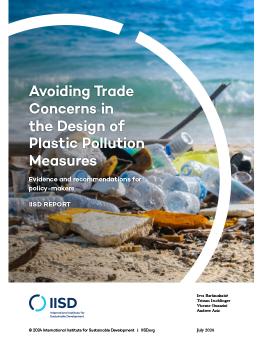
Avoiding Trade Concerns in the Design of Plastic Pollution Measures
Evidence and recommendations for policy-makers
IISD provides insights on aspects of World Trade Organization (WTO) members' plastics that have created friction with trading partners and suggests recommendations for the adoption of such policies in the future. The authors identify the nature and categories of the issues that have been raised. This policy brief aims to help policy-makers avoid possible friction that may emerge because of trade-related policy measures aimed at reducing plastic pollution.
-
#Trade related #plastic policies are on the rise as #INC negotiates the provisions of a new Plastics Treaty. @IISD_ELP looks at ways to help #WTO members avoid trade frictions while battling #plasticpollution.
-
We need an ambitious #Plastics Treaty—but the world is not waiting for the negotiations to conclude. Of over 250 #WTO notifications of plastics measures, only 21 received closer scrutiny—and @IISD_ELP is ready to unpack this!
-
#Trade relations can support #environment ambitions. @IISD_ELP proposes recommendations that will help avoid trade frictions while fighting #plasticpollution.
In March 2022, United Nations (UN) member states gathered in Nairobi, Kenya, and adopted one of the most ambitious resolutions for environmental protection in recent history. UN Environment Assembly Resolution 5/14 established a mandate for countries to end plastic pollution and establish an international, legally binding agreement addressing the full life cycle of plastics by the end of 2024. Because plastic products are so ubiquitous, initiatives aiming to meet the resolution's deadline will impact a myriad of products flowing through supply chains around the world. Inevitably, new national and international policies aiming to curb the manufacture, sale, import/export, and use of certain types of plastics, plastic products, or plastic waste will impact trading partners, sometimes in unforeseen ways.
Many WTO members have already established national bans and prohibitions of specific plastic products to restrict their use, and some have also added supplementary requirements with conditions on the ways in which plastic products are allowed to enter their markets. Due to the absence of a global agreement harmonizing the conditions of plastic-related prohibitions, restrictions, and requirements, governments have been left on their own to define scope or conditions.
The brief examines instances in which plastics-related policies implemented by WTO members have created friction between trading partners due to their actual or potential impact on trade. The authors identify where such friction has arisen, determine the nature and categories of the issues that have been raised, and provide recommendations for future regulations.
Funded by
You might also be interested in
Trade-Related Policy Measures to Reduce Plastic Pollution: Building on the state of play
This report looks at the trade-related plastic pollution-reduction measures notified by World Trade Organization (WTO) members in order to provide inspiration for further actions and international cooperation options.
Border Carbon Adjustment Mechanisms and Impacts on Vietnam
This report consolidates, analyzes, and presents views and perspectives of stakeholders from Vietnam on border carbon adjustment (BCA) schemes to contribute to the global debate on BCA good practices.
The United Kingdom's Strategy for Carbon Border Adjustment in a Changing Global Landscape
This report consolidates, analyzes, and presents views and perspectives of United Kingdom stakeholders on its proposed Carbon Border Adjustment Mechanism (CBAM) to contribute to the global debate on international principles and best practices for national border carbon adjustment schemes.
Border Carbon Adjustments: Trinidad and Tobago country report
This report consolidates, analyzes, and presents views and perspectives of stakeholders from Trinidad and Tobago on border carbon adjustment (BCA) schemes to contribute to the global debate on BCA good practices.
